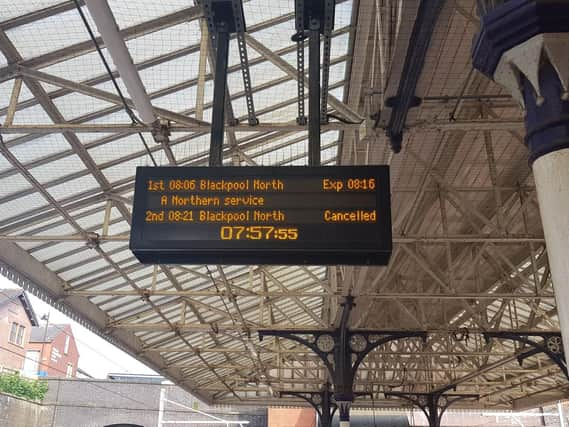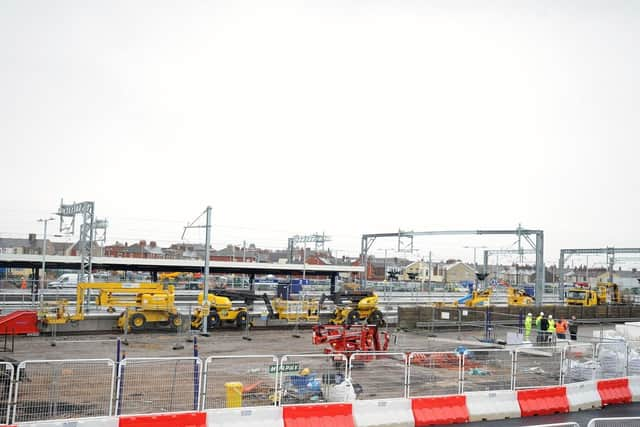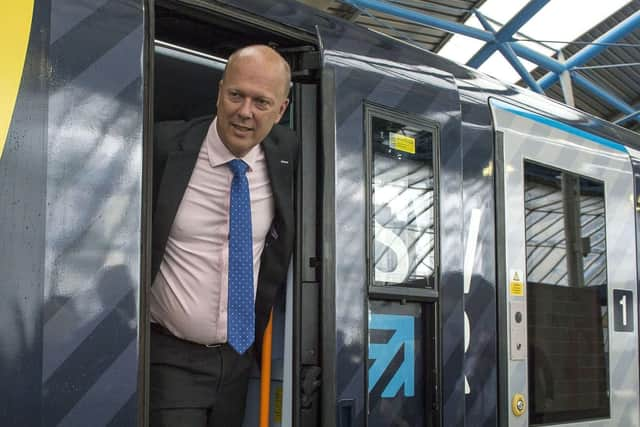Lack of communication made summer rail chaos worse as investigation shows 'no-one took charge'


The Government said the review will be "the most significant since privatisation" and will consider all parts of the sector, including accountability, the franchising system and value for money for passengers and taxpayers.
An investigation by the Office of Rail and Road (ORR) regulator into the May timetable change concluded Network Rail, Govia Thameslink Railway (GTR), Northern, the Department for Transport and the ORR itself all made mistakes.
Advertisement
Hide AdAdvertisement
Hide AdIn Lancashire rail experts said systemic lack of communication between train operating companies and the body responsible for the infrastructure created the situation and made it worse.


Delays in the electrification and upgrading of the tracks and signals between Manchester, Preston and Blackpool led to chaos when Northern and other operators launched the May changes to the timetables with an increased number of services.
Northern cancelled up to 310 scheduled trains each weekday during the disruption, which lasted several weeks.
Blackpool-based Rail sector champion Stephen Brookes said: "It was a total failure of communication.
Advertisement
Hide AdAdvertisement
Hide Ad"The rail operating companies could not deliver the timetable changes, passengers were left stranded and Network Rail were just sat in their ivory tower. The people who drew up the timetables and the policies simply imposed them and no-one communicated the problems.


"What has to be learned for this, is that the rail operating companies, stakeholders, passengers must in the future work together to create a workable railway that serves everyone. Currently there is no strategy in place for communication and this has to be resolved to give confidence to passengers, particularly older and disabled passengers that they will be able to complete their journey."
The ORR's inquiry's interim report warned of a "lack of clarity about roles and responsibilities".
It stated: "The impact of this experience has had a significant financial and emotional cost to those passengers affected, directly impacting upon their work and families and in some circumstances their personal safety.
Advertisement
Hide AdAdvertisement
Hide Ad"The present industry arrangements do not support clarity of decision making: it was unclear who was responsible for what.


"Nobody took charge."
The regulator's 183-page report catalogued failures by various organisations which led to this outcome.
They included:
- Delays with Network Rail's electrification work in the North;
- Network Rail's unit responsible for producing timetables did not have a sufficient method of working to manage the scale of changes required;
Advertisement
Hide AdAdvertisement
Hide Ad- GTR and Northern were not "properly aware or prepared" for the problems with the new timetables and did not do enough to provide accurate information to passengers when disruption occurred;
- The DfT and ORR failed to sufficiently examine the assurances they received from the industry about the risk of disruption.
Events and decisions taken before January meant it was "probably unavoidable" that the launch would fail, according to the report. If there was a final go/no-go decision point it was in autumn 2017.
ORR chairman Professor Stephen Glaister, who led the inquiry, said: "Good intentions and over-optimism within the rail industry about its ability to recover missed deadlines left no time to uncover and fix problems.
Advertisement
Hide AdAdvertisement
Hide Ad"When problems arose, timetable planners were stretched and train operators were ill-equipped to help passengers."
The rail review commissioned by the Government will be led by Keith Williams - deputy chairman of John Lewis and former chief executive of British Airways - who will be supported by an external panel.
A White Paper will be published next year after Mr Williams publishes his report. Reforms are expected to be implemented from 2020.
He said the industry is facing "significant challenges".
Transport Secretary Chris Grayling has blamed systemic failures for May's timetable disruption and has said the priority is now to "make sure this can never happen again" rather than "point fingers".
Advertisement
Hide AdAdvertisement
Hide AdHe denied that he was to blame and said he had been told by top people within the industry before the timetable change that things were fine.
He said: "It's tough for a politician to say to professionals in the industry to give you an assurance that something is ready and to tell them they're wrong. The priority now is to make sure this can never happen again."
Barry White, Chief Executive of Transport for the North, said: “The interim findings of this Glaister Review clearly highlight that there is a real need for radical change in the way the rail industry operates. Fundamentally, as our members have said from the outset, changes are needed so we can be sure passenger’s interests are put front and centre of every decision made.”
He added: “The Report’s summary highlights the Rail Delivery Group’s statement that ‘the timetable is our promise to passengers’. This summer, in the North of England, and elsewhere, that promise was broken. That is unacceptable. It was passengers who suffered and that must not be allowed to happen again.”